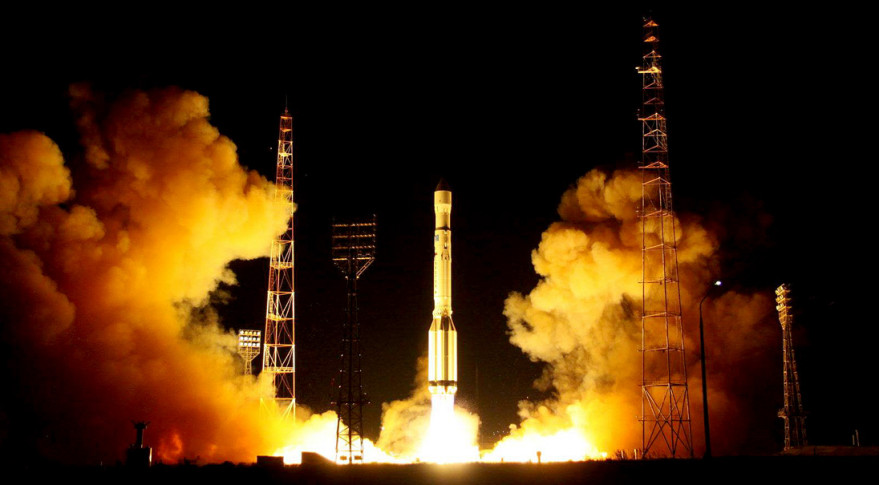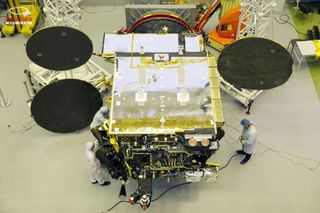Russia's Express AM8 Satellite Launch Aligns Capacity with Demand

PARIS — The successful Proton launch Sept. 14 of the Express AM8 telecommunications satellite completes the most urgent fleet-replenishment requirements and puts Russia’s satellite bandwidth supply into a favorable balance with expected demand, Russia’s two satellite fleet operators said Sept. 16.
The launch, from the Russian-run Baikonur Cosmodrome in Kazakhstan, was the second since Proton's May failure. The Proton vehicle used a new version of the DM upper stage and not the Breeze-M upper stage that in recent years has replaced DM aboard Proton.
Express AM8 is owned by the Russian Satellite Communications Co. (RSCC) of Moscow, which has suffered from Proton’s error-prone record in the past six years more than any other company.
The 2,100-kilogram Express AM8 was built by ISS Reshetnev of Krasnoyarsk, Russia, and carries a C-, Ku- and L-band payload provided by Thales Alenia Space of France and Italy, a longstanding Reshetnev partner. The satellite is designed to deliver 5.9 kilowatts of power to its payload at the end of its 15-year service life.
Express AM8's 28 C-band transponders will be dedicated to two beams, one including Europe, Africa and the Middle East, and a second in Latin America with a stretch of the U.S. East Coast.
The satellite's 20 Ku-band transponders will be devoted to three beams, over Europe and the Middle East, Africa and the Middle East, and Latin America and the eastern United States. The three L-band transponders will be used for secure government communications.
The satellite's arrival at 14 degrees west "paves the way for RSCC to the regional market of Latin America, and provides additional opportunities to develop business in Africa, Europe and the Middle East," RSCC Chief Executive Yuri Prokhorov said in a Sept. 15 statement.
Get the Space.com Newsletter
Breaking space news, the latest updates on rocket launches, skywatching events and more!

The satellite is part of the Russian government's 2009-2015 television and radio broadcasting development program, with non-Russian beams to be commercialized by RSCC.
The launch, combined with recent launches of telecommunications satellites for Gazprom Space Systems of Moscow, Russia's second main fleet operator, has made up for the capacity shortage provoked by several Proton failures, said Dmitry Sevastiyanov, director-general of Gazprom Space Systems.
"There is now plenty of capacity over the Russian market," Sevastiyanov said here Sept. 16. He said the problem for his company, as is true to some extent for RSCC, is how to recover satellite costs — some incurred in euros — from a market in which the Russian ruble has declined sharply against the euro and the U.S. dollar.
Raising transponder-lease rates to Russian customers is something both companies prefer to avoid in rural Russia, Sevastiyanov said.
RSCC Chief Financial Officer Dennis Pivnyuk said RSCC’s fleet was slightly less than 70 percent full before the Express AM8 launch. Pivnyuk said the Russian market is characterized by a wide variation in the prices paid for transponder capacity. In some regions it is around $1,000 per megahertz per month, while in other regions it is $3,000.
This story was provided by SpaceNews, dedicated to covering all aspects of the space industry.
Join our Space Forums to keep talking space on the latest missions, night sky and more! And if you have a news tip, correction or comment, let us know at: community@space.com.
Peter B. de Selding is the co-founder and chief editor of SpaceIntelReport.com, a website dedicated to the latest space industry news and developments that launched in 2017. Prior to founding SpaceIntelReport, Peter spent 26 years as the Paris bureau chief for SpaceNews, an industry publication. At SpaceNews, Peter covered the commercial satellite, launch and international space market. He continues that work at SpaceIntelReport. You can follow Peter's latest project on Twitter at @pbdes.

